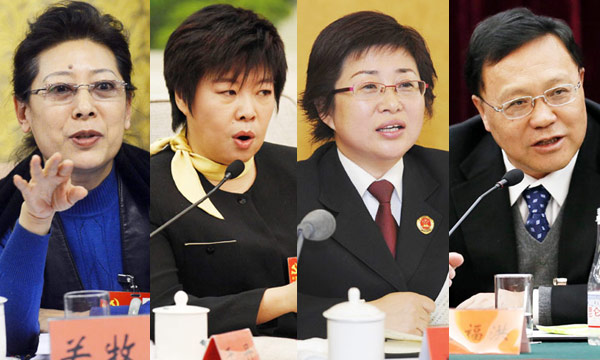Hu expounds on economic policies at APEC CEO summit
(Xinhua)
Updated: 2012-09-08 11:32
Chinese President Hu Jintao on Saturday talked about China's current economic situation and economic policies in a key-note speech at the CEO summit of the Asia-Pacific Economic Cooperation (APEC) forum.
China, Hu said, has focused this year on ensuring stable growth and price stability, adjusting economic structure, improving people's well-being, deepening reform and promoting harmony.
These efforts have ensured the stable performance of China's economy, with its GDP, in the first half of the year, growing by 7.8 percent year on year and retail sales increasing by 14.4 percent, he said.
Speaking of the challenges besetting China's economy, Hu said lack of balance, coordination and sustainability still weigh on the country's economic growth and notable downward pressure remains, especially for the Small and Medium Enterprises (SME) and exporters.
Amid these challenges, China would continue a proactive fiscal policy and a prudent monetary policy, ensure continuity and stability of macroeconomic policies, and make macroeconomic regulation more targeted, flexible and forward-looking, the president said.
China will also strive to boost domestic demand and maintain steady and robust growth, while keeping the price level basically stable, he said, noting that his country will take four steps to achieve the goal.
The first step is to promote home-driven growth.
Long-term mechanisms to boost domestic demand will be put in place to ensure that growth is driven by consumption, investment and export in a balanced way, Hu said.
"We will give priority to making strategic adjustments to China's economic structure so as to accelerate the shift of growth model," Hu said.
He also pledged to strengthen agriculture, raise core competitiveness of the manufacturing sector, cultivate and develop strategic emerging industries, and accelerate the development of the service sector to sustain the coordinated development of primary, secondary and tertiary industries.
To promote inclusive growth is the second step.
To ensure that growth will contribute to people's well-being, the government will focus on addressing issues "that are of greatest and most immediate concern to the people", including education, old-age care, medical care and housing, Hu said.
He also promised to "phase in a system for ensuring social equity featuring equal rights, equal opportunities and equal rules, a system that gives people equal access to development opportunities."
Another step is to promote innovative-driven development.
Progress in science and technology and innovation are crucial in accelerating the shift of growth model, Hu noted.
"Competent personnel are the primary resources for development," he said, pledging to continue the pursuit of "the strategy of making China strong through science, education and human development."
He vowed to focus on strengthening the capacity for indigenous innovation, deepen reform of the management system for science and technology, and remove key obstacles hindering innovation.
"We will speed up the building of a national innovation system, strengthen mechanisms for human resources development, improve the environment for innovation, an enhance opening-up and cooperation in science and technology so as to build an innovation-driven country," Hu said.
The fourth step is to work to achieve mutually-beneficial and win-win outcomes.
China has been pursuing the basic state policy of opening-up and engaging in pushing forward the regional opening-up pattern for years.
"We will encourage both foreign investment in China and Chinese investment overseas," Hu said, vowing to open more sectors, increase and deepen common interests with other parties and improve the institutions and mechanisms to make them better suited to the development of an open economy.
China will foster an open and transparent legal environment, an environment for fair market competition, and a stable and orderly business environment to create good conditions for investors, he said.
Beijing will move faster to implement the Free Trade Agreement, strengthen ties with key trading partners, and deepen pragmatic cooperation with other emerging markets and developing countries, he noted.
Hu, who is here for the APEC Economic Leaders' Meeting slated for Saturday and Sunday, will discuss with leaders of other APEC members trade and investment liberalization, regional economic integration, food security as well as cooperation in fostering innovative growth.
APEC, a premier economic forum in the Asia-Pacific region, was established in 1989. It has grown to encompass 21 members spanning four continents, and accounts for about 40 percent of the world's population, 57 percent of the global GDP and 48 percent of the world trade.
The APEC CEO summit, an annual forum for representatives of the Asia-Pacific business leaders, is part of a series of meetings organized for leaders and senior officials from all APEC economies.

Top News
Xi emphasizes adherence to CPC Congress spirit
Top legislator urges implementation of congress spirit
Moderately prosperous China brings chances to world
Video







